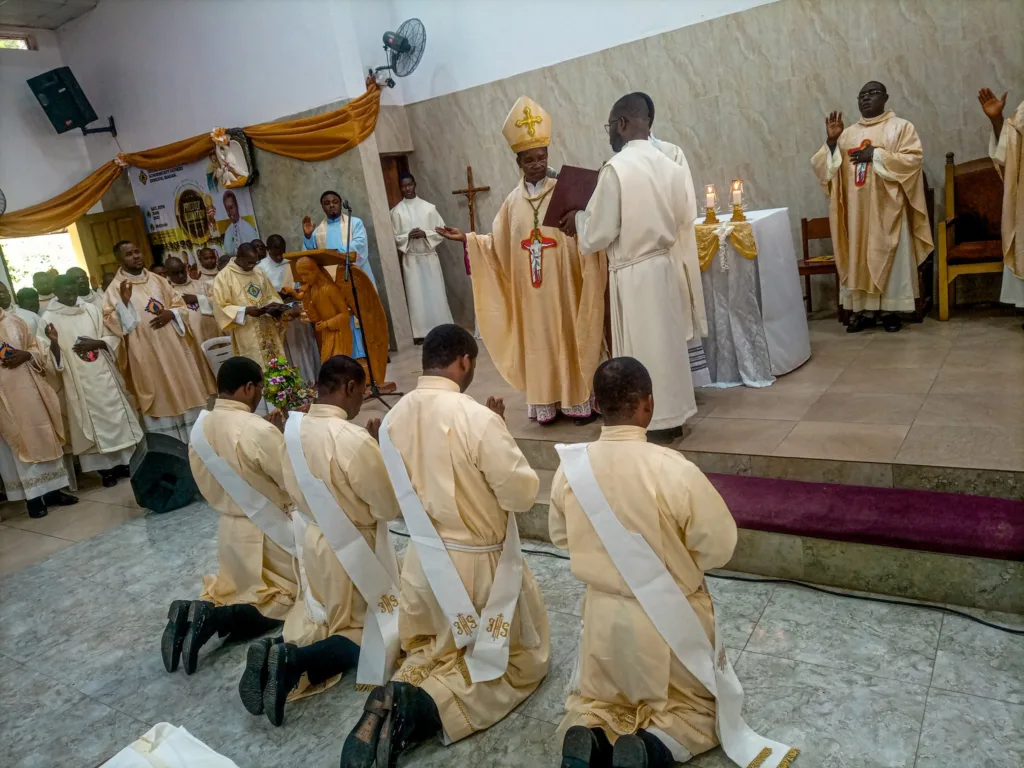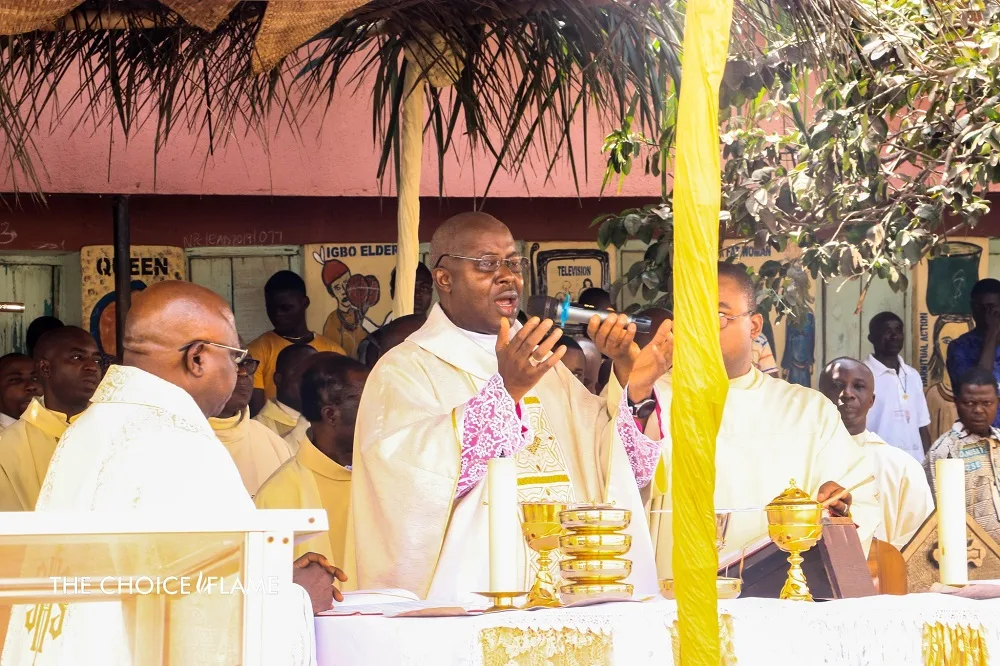Guide to Becoming a Catholic Priest in Nigeria (2024)
To become a Catholic priest as a Nigerian takes a lot of courage, especially in today’s world.
The call to serve spiritually can be both moving and daunting. The sacrifices, years spent in the seminary, chastity, not getting married e.t.c can easily deter one from answering the call to serve as a priest in the Catholic church.
Understanding the journey and the steps you need to take to respond to this call is essential for turning your aspiration into realization.

Picture of Nigerian Catholic priests being Ordained by a Bishop
Today, we will take you on a voyage to comprehend the intricacies of becoming a Catholic Priest in Nigeria.
WHAT BEING A CATHOLIC PRIEST IN NIGERIA ENTAILS
Just like being a Catholic nun or monk, joining the priest hood in Nigeria means total service to Christ and His church. You are expected to remain unmarried as long as you live, administer the sacraments, hear confessions, say the Holy mass on a daily basis, live a life in obedience to your presiding bishop, etc. These are some of the duties of a Catholic priest.
Just be aware that a Priest’s lifestyle is vastly different from the layman’s. It’s characterized by solitude, prayer, community service, and obedience to the church’s hierarchy. The sacrament of Holy Orders is the centerpiece of a priest’s ordination into the ecclesiastical life.
Being a Catholic priest in Nigeria is a serious calling that balances deep spiritual commitment and the social fabric of the community. Here’s a glimpse into their lives:
BEING A SPIRITUAL SHEPHERD AND LEADER
- Ministering the Sacraments: At the heart of their role lies the administration of the seven sacraments, from baptisms and weddings to confessions and the Eucharist. They are the bridge between the faithful and God, guiding them through life’s significant moments and offering spiritual solace.
- Preaching and Teaching: Priests deliver sermons and lead prayers, fostering spiritual growth and understanding of the Catholic faith. They also teach catechism classes, preparing individuals for the sacraments and nurturing the faith of the younger generation.
- Counseling and Guidance: Catholic priests in Nigeria are often sought for advice and support. They offer counseling on various issues, from marital problems to financial difficulties, drawing upon their knowledge of scripture and their pastoral experience.
BEING THE COMMUNITY PILLAR AND ADVOCATE
- Social Outreach and Development: Catholic priests in Nigeria are deeply involved in social outreach programs, addressing issues like poverty, healthcare, and education. They run schools and clinics, organize charity drives, and advocate for social justice, empowering their communities.
- Interfaith Dialogue and Peacebuilding: Nigeria’s diverse religious landscape presents challenges, and priests play a crucial role in promoting interfaith dialogue and understanding. They work with leaders from other faiths to foster peace and harmony within communities.
- Cultural Bridge and Tradition Keeper: Catholic priests in Nigeria navigate the intersection of faith and local cultures. They celebrate the richness of Nigerian traditions while upholding the core tenets of Catholicism, fostering a sense of cultural identity and belonging within their communities.
EMBRACING ITS CHALLENGES AND REWARDS
- Security Concerns: Unfortunately, parts of Nigeria face security challenges, and priests can be vulnerable to threats like kidnapping or violence. This necessitates a certain degree of courage and resilience in their service.
- Demanding Workload: With vast parishes and limited resources, priests often juggle multiple tasks, from administrative duties to pastoral care. This can be physically and emotionally taxing, requiring strong organizational skills and unwavering dedication.
- Finding Fulfillment: Despite the challenges, being a Catholic priest in Nigeria can be immensely rewarding. Witnessing the impact of their work on individuals and communities, fostering spiritual growth, and alleviating suffering brings immense personal satisfaction.
LIVING A LIFE OF SERVICE AND DEDICATION TO GOD
Ultimately, being a Catholic priest in Nigeria is a life dedicated to serving God and community. It requires a deep commitment to faith, unwavering compassion, and a strong sense of social responsibility. They are pillars of their communities, guiding individuals on their spiritual journeys and making a tangible difference in the lives of those around them.
HOW TO BECOME A CATHOLIC PRIEST IN NIGERIA (2024)
Perhaps it was a divine inspiration, a strong inner urge, or a lifelong aspiration that led you to contemplate priesthood in the Nigerian Catholic Church. But how does one navigate this sacred call? This article will unravel the step-by-step guide to become a Catholic priest in Nigeria.
STEP 1: DISCERNING YOUR VOCATION
First start by spending time in quiet reflection and prayer, honestly evaluating your motivations and desires. Seek guidance from spiritual mentors, priests, or religious communities to gain different perspectives.
You also want to immerse yourself in learning about the Catholic faith, the role of priests, and the realities of priestly life in Nigeria. Talk to current priests, visit seminaries, and attend vocational discernment retreats.
STEP 2: MEET THE BASIC REQUIREMENTS
To become a priest of the Catholic church in Nigeria, you need to fulfil the academic qualifications. You’ll need a minimum of five credits in your Senior Secondary School Certificate Examination (SSCE) or West African Examinations Council (WAEC), including English and Mathematics. Some dioceses may require higher qualifications.
Also, you must be a baptized and confirmed Catholic male at least 18 years old. You must be unmarried and willing to commit to a life of celibacy.
You should also be in good physical and mental health to manage the demands of seminary life and priestly ministry.
STEP 3: CONTACT YOUR LOCAL DIOCESE
At this stage, you will have to reach out to the vocations director of your diocese . A Vocations Director is usually responsible for guiding potential candidates. Get in touch and express your interest in the priesthood. They will provide you with more information and answer your questions.
The Vocations Director will conduct an initial interview to assess your suitability for the priesthood. You may also undergo psychological and aptitude tests if necessary.
STEP 4: ENTER A MAJOR CATHOLIC SEMINARY
The next step is to join a Catholic seminary school where you will begin your education to becoming a priest. Major seminaries in Nigeria include the Sacred Heart Seminary, Abeokuta, and Good Shepherd Seminary, Kaduna. There are three courses to study there with their duration.
- Preparatory Course (Philosophy): If selected, you’ll begin with a one-year preparatory course focused on philosophy, scripture, and basic Latin. This helps prepare you for the more rigorous studies ahead.
- Philosophy Studies: Following the preparatory course, you’ll spend two years studying philosophy, delving into logic, ethics, metaphysics, and other disciplines that strengthen your intellectual foundation.
- Theology Studies: For four years, you’ll immerse yourself in the study of theology, exploring scripture, church history, dogma, and moral theology. This equips you with the knowledge and understanding to minister effectively.
STEP 5: PASTORAL FORMATION
During your final year, you’ll gain practical experience through pastoral internships in parishes or other ministry settings. This allows you to apply your knowledge and develop pastoral skills under the guidance of experienced priests.
Upon successful completion of your studies, you’ll be ordained a deacon, serving in a parish and assisting the priest in various liturgical and pastoral duties.
STEP 6: ORDINATION AND PRIESTLY LIFE
After completing your training and successfully meeting all the necessary requirements, the path to ordination becomes clear. The Bishop ordains you as a deacon, then you’ll be ordained a priest, ready to serve God and your community as a spiritual leader. Your Priestly journey is far from uniform as it varies based on the assignments and responsibilities given by your bishop.

Picture of Catholic Priest in Nigeria Celebrating The Holy Mass
THE VOWS AND VIRTUES OF PRIESTLY LIFE
To become a catholic priest in Nigeria entails embracing the three sacred vows of poverty, chastity, and obedience. These vows embody the tenets of a humble, devoted life, free from worldly distractions and bound to the spiritual advancement of oneself and the community.
- Poverty: Embracing poverty is not about material deprivation, but a deliberate detachment from worldly possessions. It is a radical act of trust in God’s providence, freeing the priest from the shackles of greed and materialism. This allows him to fully dedicate himself to the needs of others, becoming a beacon of simplicity and compassion in a world consumed by acquisition.
- Chastity: The vow of chastity transcends mere abstinence, evolving into a profound consecration of one’s whole being to God’s love. It is a dedication of the affections, not to personal desires, but to the boundless love that transcends human relationships. This purity of heart fuels a deep empathy for the vulnerable and provides a sanctuary for those seeking solace and guidance.
- Obedience: Obedience is not about blind servitude, but rather a willing surrender to the guidance of the Church and the will of God. It is a path of humility and trust, allowing the priest to be an instrument of divine purpose, channeling his energies towards building a just and compassionate society. This obedience strengthens the bond of unity within the community, creating a tapestry of shared mission and collective action.
Beyond the individual impact, these vows ripple outwards, shaping the very fabric of Nigerian society. The priest’s vow of poverty inspires acts of generosity and charitable outreach, alleviating the plight of the marginalized. His commitment to chastity serves as a powerful testament to the enduring value of love and fidelity, challenging the fleeting allure of superficiality. And his unwavering obedience becomes a cornerstone of social order, uniting communities in a shared vision of ethical conduct and righteous purpose.
FREQUENTLY ASKED QUESTIONS ABOUT BECOMING A CATHOLIC PRIEST IN NIGERIA
WHAT ARE THE BASIC REQUIREMENTS TO BECOME A CATHOLIC PRIEST IN NIGERIA?
To become a Catholic priest in Nigeria, you typically need a solid Catholic faith foundation, a high school diploma or its equivalent, and a bachelor’s degree in philosophy and theology from a recognized seminary or institution.
HOW LONG DOES IT TAKE TO BECOME A CATHOLIC PRIEST IN NIGERIA?
The process of becoming a Catholic priest in Nigeria usually takes about six to eight years. This includes four years of philosophical studies and two to four years of theological studies in a seminary.
CAN I BECOME A PRIEST IF I DIDN’T ATTEND A CATHOLIC SCHOOL?
While attending a Catholic school can be beneficial, it is not a strict requirement. However, a strong Catholic faith and a commitment to the teachings of the Church are essential.
WHAT IS THE AGE LIMIT FOR ENTERING THE SEMINARY IN NIGERIA?
The age limit for entering the seminary can vary, but it is generally advisable to begin the application process in your late teens or early twenties. Some dioceses may have specific age requirements, so it’s important to check with the local diocese.
DO I NEED TO BE CELIBATE TO BECOME A CATHOLIC PRIEST IN NIGERIA?
Yes, celibacy is a requirement for Catholic priests. Candidates for the priesthood are expected to embrace a life of celibacy, which means abstaining from marriage and maintaining a life of prayer and service.
WHAT IS THE DISCERNMENT PROCESS LIKE IN NIGERIA FOR ASPIRING PRIESTS?
The discernment process involves a series of interviews, psychological evaluations, and spiritual direction. Candidates also spend time in prayer and reflection to discern whether they are called to the priesthood.
CAN WOMEN BECOME CATHOLIC PRIESTS IN NIGERIA?
No, as of now, the Catholic Church does not ordain women as priests. The priesthood is reserved for men, in accordance with the teachings and traditions of the Church.
IS FINANCIAL SUPPORT PROVIDED DURING SEMINARY TRAINING?
Many dioceses provide financial support for seminarians, covering tuition, room, and board. However, the level of support can vary, and candidates are encouraged to inquire about financial arrangements with the specific diocese they are considering.
WHAT ROLE DOES THE BISHOP PLAY IN THE ORDINATION PROCESS?
The bishop is central to the ordination process. He oversees the formation of candidates in the seminary, and it is the bishop who ultimately decides whether a candidate is ready for ordination.
ARE THERE OPPORTUNITIES FOR FURTHER EDUCATION AFTER ORDINATION?
Yes, after ordination, priests may pursue additional studies and specializations in theology, pastoral care, or other related fields to enhance their ministry.
CONCLUSION
Becoming a Catholic Priest in Nigeria is a significant spiritual endeavor. It requires deep introspection, rigorous training, unwavering faith, and a profound commitment to serve the community. Each journey is unique, and every Nigerian priest has a story that mirrors their walk with God.
To become a Catholic priest in Nigeria is to embrace a life not ordinary, but extraordinary. It is to step into a sacred arena where personal sacrifice becomes the catalyst for profound change, both within oneself and across the wider community. The vows of poverty, chastity, and obedience, far from being constraints, become potent tools for unlocking a life of meaning, purpose, and enduring service to God and humanity.
As you embark on this lustrous path of service, remember that the journey of a thousand miles begins with a single step!
I end this article with the words of His Eminence, Cardinal Arinze “The priesthood is not a career, it is a calling.”
In this noble mission, remember God’s calling may not be to walking this path alone but to inspire others along the way. A decision to serve as a Priest comes with divine grace—embrace it!


